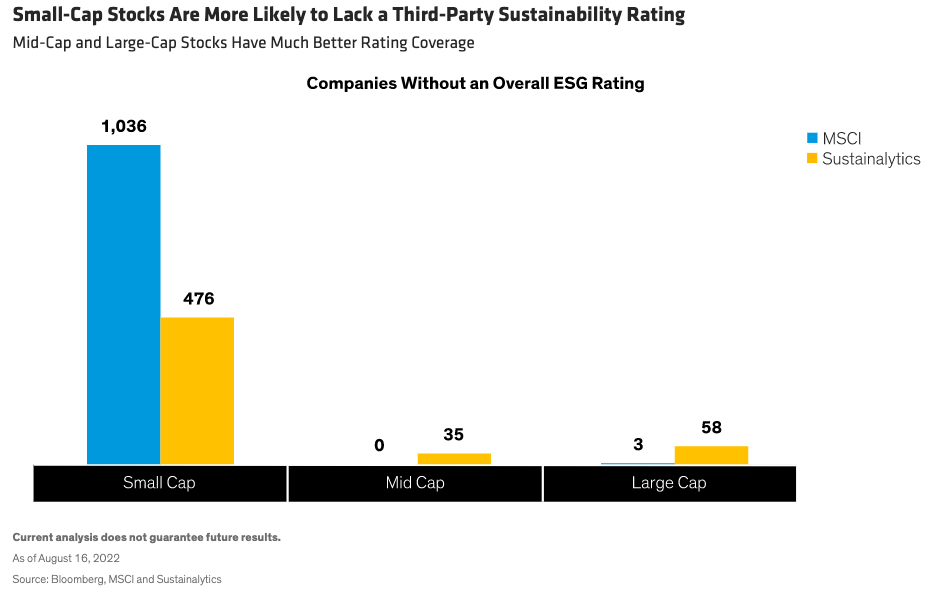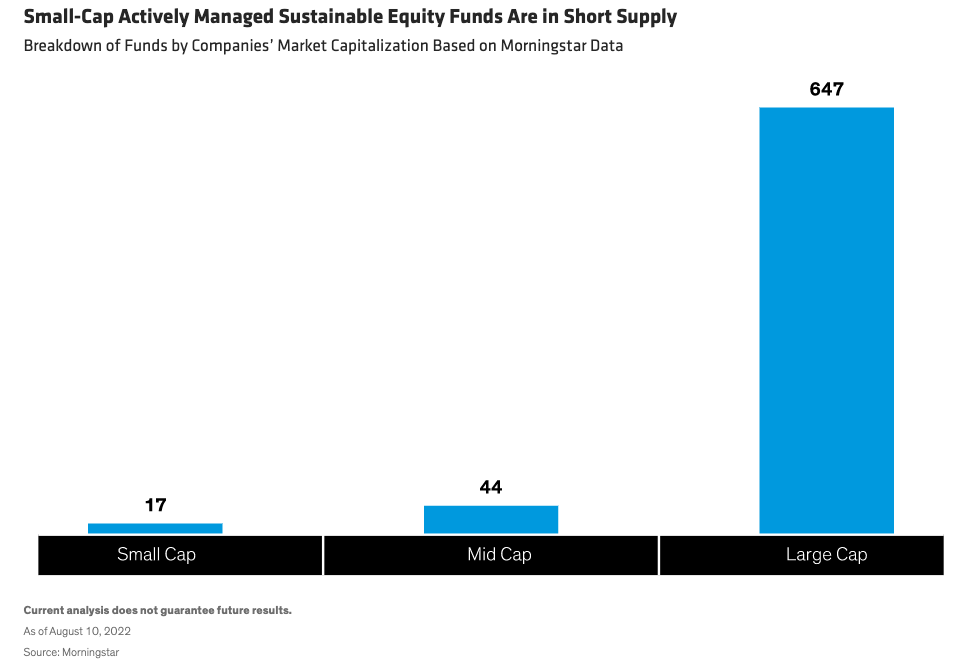AllianceBernstein: Finding the ESG Edge in Global Small-Cap Stocks
Published 09-02-22
Submitted by AllianceBernstein

Edward Bryan, CFA | Portfolio Manager—Sustainable Global Small Cap Portfolio; Senior Research Analyst—Sustainable Thematic Equities
Daniel C. Roarty, CFA| Chief Investment Officer—Sustainable Thematic Equities
In small-cap markets, fundamental research is in short supply—and good environmental, social and governance (ESG) research is even scarcer. But diligent investors can still find ways to access robust ESG data and create active global small-cap portfolios of companies that are making meaningful contributions to address sustainability issues.
ESG ratings are lacking for small-cap stocks globally. This prevents asset managers who rely exclusively on third-party ratings from building small-cap funds. Since smaller companies often struggle to complete all the disclosures necessary to earn a rating, many remain unrated by leading ratings providers (MSCI and Sustainalytics) even if they disclose a range of valuable ESG information (Display).
Complying with relevant ESG regulation—in particular, the European Union’s (EU’s) Sustainable Finance Disclosure Regulation (SFDR)—is nearly impossible for small-cap managers to do using third-party ESG ratings alone. From January 2023, SFDR will require investment managers who have classified their funds as article eight or nine to provide a wide range of environmental, social and governance data.
Data consistency is another challenge. The shortage of data and wide variations in methodology between the leading ESG ratings providers lead to low correlations between their ratings, making it hard for fund managers to adopt a consistent approach. That applies particularly in small-cap stocks, where the rating correlations are less than half those in large-cap markets.
As a result, sustainable global small-cap strategies are very rare, in sharp contrast to the popularity of sustainable funds in larger-cap markets (Display).

Proprietary Research Unlocks Sustainable Small-Cap Opportunities
These challenges shouldn’t deter investors with a sustainable agenda from smaller stocks, in our view. Many of the most innovative providers of goods and services that address sustainability issues such as climate change and health are smaller companies. And small-cap stocks often offer attractive return potential, in part because the lack of analyst coverage can create opportunities to capitalize on mispricing.
So how can investors overcome the ESG data challenges of smaller companies? We believe that asset managers should develop independent assessments to determine a company’s sustainability credentials and earnings potential. This requires a clear process that we think should include the following components: a mapping approach geared to clearly defined sustainability objectives; proprietary ESG scoring of material issues based on in-house forward-looking fundamental research; and engagement with management teams to better understand companies’ ESG risk–mitigation strategies.
Defining Objectives with the UN SDGs
In our view, the most widely recognized and comprehensive set of sustainable objectives globally is the UN Sustainable Development Goals (SDGs). By mapping to the SDGs a manager can unearth companies that are providing solutions to the world’s biggest sustainability challenges.
The SDGs provide a robust framework to identify companies whose products and services are contributing to sustainable development. We’ve created a list of products and services that we believe are relevant for achieving the SDGs. Using data analysis techniques, that list is then used to identify companies whose products and services contribute to the achievement of the SDGs, which forms an investment universe. For instance, our mapping process has identified waste-management equipment and services as a product contributing to the achievement of SDG 12. Our research identified Li-Cycle as aligned to this product as a leader in recycling lithium-ion batteries, which is crucial for a successful transition to electric vehicles. Our robust mapping process enabled us to include the company in our investable universe despite its lack of an MSCI rating.

From Independent Research to Active Engagement
After creating a defined investment universe, independent fundamental research can be used to build a comprehensive picture of a company’s ESG profile, including material risks and company actions to mitigate those risks. This approach is particularly valuable for smaller companies, as ratings agencies use fewer indicators and collect less data for small cap companies than for their large-cap counterparts. Fundamental research conducted by sector analysts can help uncover important information that may otherwise be missed if depending on third-party ESG ratings.
Such research could include, for example, leveraging data and analytics derived from Glassdoor job reviews or from occupational safety and health administration violations. Monitoring data trends can help identify changes in a company’s culture—a key social pillar. An improving trend can provide comfort where no third-party rating exists—and deterioration can be a red flag that an existing rating may no longer be deserved.
Selecting an attractive portfolio candidate based on alignment to the SDGs and careful consideration of ESG risks is only the start of an effective sustainable investing strategy. By engaging with company management, portfolio teams can gain insight into companies’ future strategies, which can inform better research decisions. Engagement efforts can also be used to help companies address key risks and to improve their ESG transparency over time.
For instance, LegalZoom, an online platform for legal and compliance solutions, currently lacks an MSCI rating. However, our fundamental research has resulted in a positive view of the company’s governance practices. Although LegalZoom only went public in June 2021, it is managed by an experienced software executive. Along with a number of other top industry professionals, he joined the firm pre-IPO, and the senior management team brings with it a history of best-in-class governance practices.
By asking the right questions, portfolio managers and analysts can overcome the problems of scarce ESG data in small-cap markets. But in practice, simply adopting a formula won’t deliver the required results. It takes a strong commitment to identifying SDG linkages, integrating ESG factors into the research process and active engagement to gain an ESG edge and uncover smaller sustainable companies with bigger long-term return potential.
The views expressed herein do not constitute research, investment advice or trade recommendations and do not necessarily represent the views of all AB portfolio-management teams and are subject to revision over time.
MSCI makes no express or implied warranties or representations, and shall have no liability whatsoever with respect to any MSCI data contained herein.
The MSCI data may not be further redistributed or used as a basis for other indices or any securities or financial products. This report is not approved, reviewed or produced by MSCI.
References to specific securities are presented to illustrate the application of our investment philosophy only and are not to be considered recommendations by AB. The specific securities identified and described do not represent all of the securities purchased, sold or recommended for the portfolio, and it should not be assumed that investments in the securities identified were or will be profitable.
View original content here.

AllianceBernstein
AllianceBernstein
AllianceBernstein (AB) is a leading global investment management firm that offers diversified investment services to institutional investors, individuals, and private wealth clients in major world markets.
To be effective stewards of our clients’ assets, we strive to invest responsibly—assessing, engaging on and integrating material issues, including environmental, social and governance (ESG) considerations into most of our actively managed strategies (approximately 79% of AB’s actively managed assets under management as of December 31, 2024).
Our purpose—to pursue insight that unlocks opportunity—describes the ethos of our firm. Because we are an active investment manager, differentiated insights drive our ability to design innovative investment solutions and help our clients achieve their investment goals. We became a signatory to the Principles for Responsible Investment (PRI) in 2011. This began our journey to formalize our approach to identifying responsible ways to unlock opportunities for our clients through integrating material ESG factors throughout most of our actively managed equity and fixed-income client accounts, funds and strategies. Material ESG factors are important elements in forming insights and in presenting potential risks and opportunities that can affect the performance of the companies and issuers that we invest in and the portfolios that we build. AB also engages issuers when it believes the engagement is in the best financial interest of its clients.
Our values illustrate the behaviors and actions that create our strong culture and enable us to meet our clients' needs. Each value inspires us to be better:
- Invest in One Another: At AB, there’s no “one size fits all” and no mold to break. We celebrate idiosyncrasy and make sure everyone’s voice is heard. We seek and include talented people with diverse skills, abilities and backgrounds, who expand our thinking. A mosaic of perspectives makes us stronger, helping us to nurture enduring relationships and build actionable solutions.
- Strive for Distinctive Knowledge: Intellectual curiosity is in our DNA. We embrace challenging problems and ask tough questions. We don’t settle for easy answers when we seek to understand the world around us—and that’s what makes us better investors and partners to our colleagues and clients. We are independent thinkers who go where the research and data take us. And knowing more isn’t the end of the journey, it’s the start of a deeper conversation.
- Speak with Courage and Conviction: Collegial debate yields conviction, so we challenge one another to think differently. Working together enables us to see all sides of an issue. We stand firmly behind our ideas, and we recognize that the world is dynamic. To keep pace with an ever changing world and industry, we constantly reassess our views and share them with intellectual honesty. Above all, we strive to seek and speak truth to our colleagues, clients and others as a trusted voice of reason.
- Act with Integrity—Always: Although our firm is comprised of multiple businesses, disciplines and individuals, we’re united by our commitment to be strong stewards for our people and our clients. Our fiduciary duty and an ethical mind-set are fundamental to the decisions we make.
As of December 31, 2024, AB had $792B in assets under management, $555B of which were ESG-integrated. Additional information about AB may be found on our website, www.alliancebernstein.com.
Learn more about AB’s approach to responsibility here.
More from AllianceBernstein

